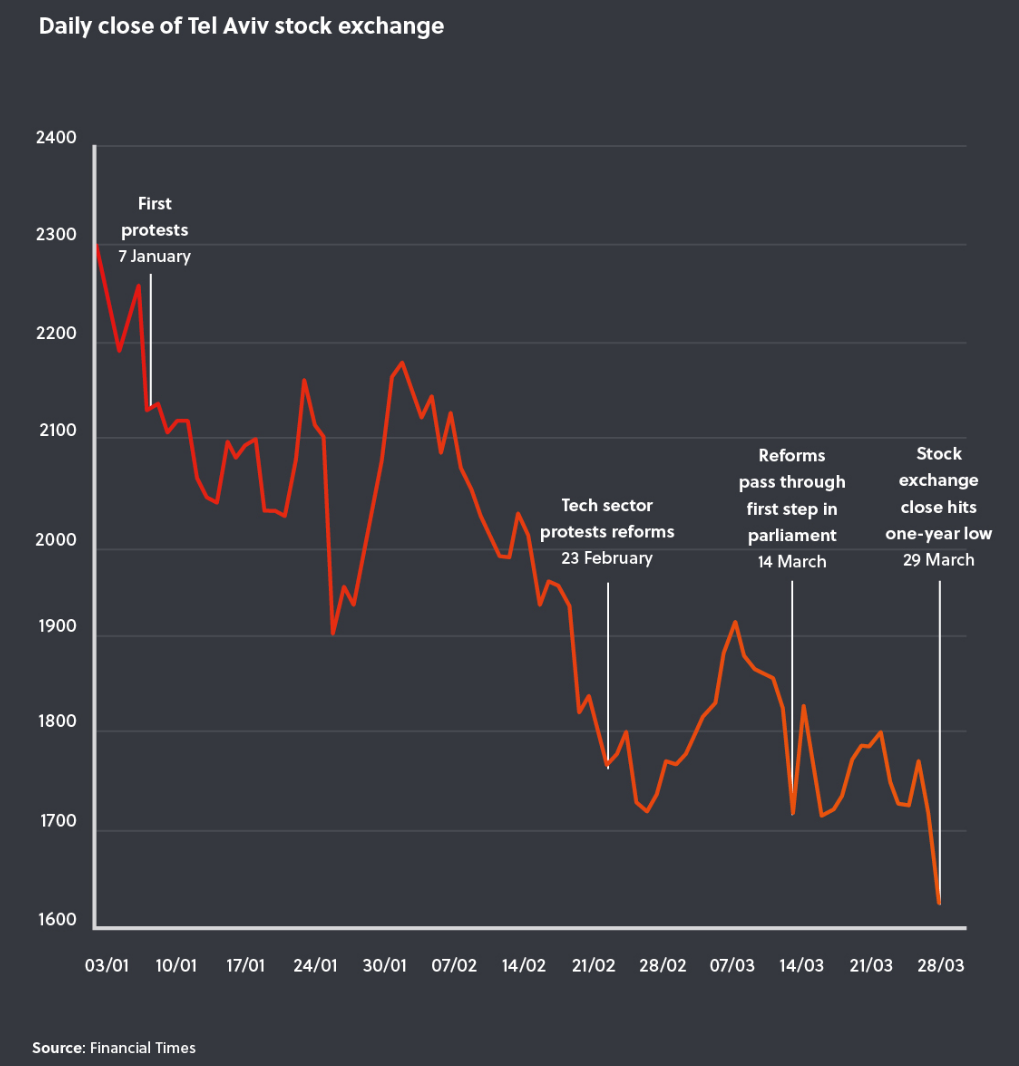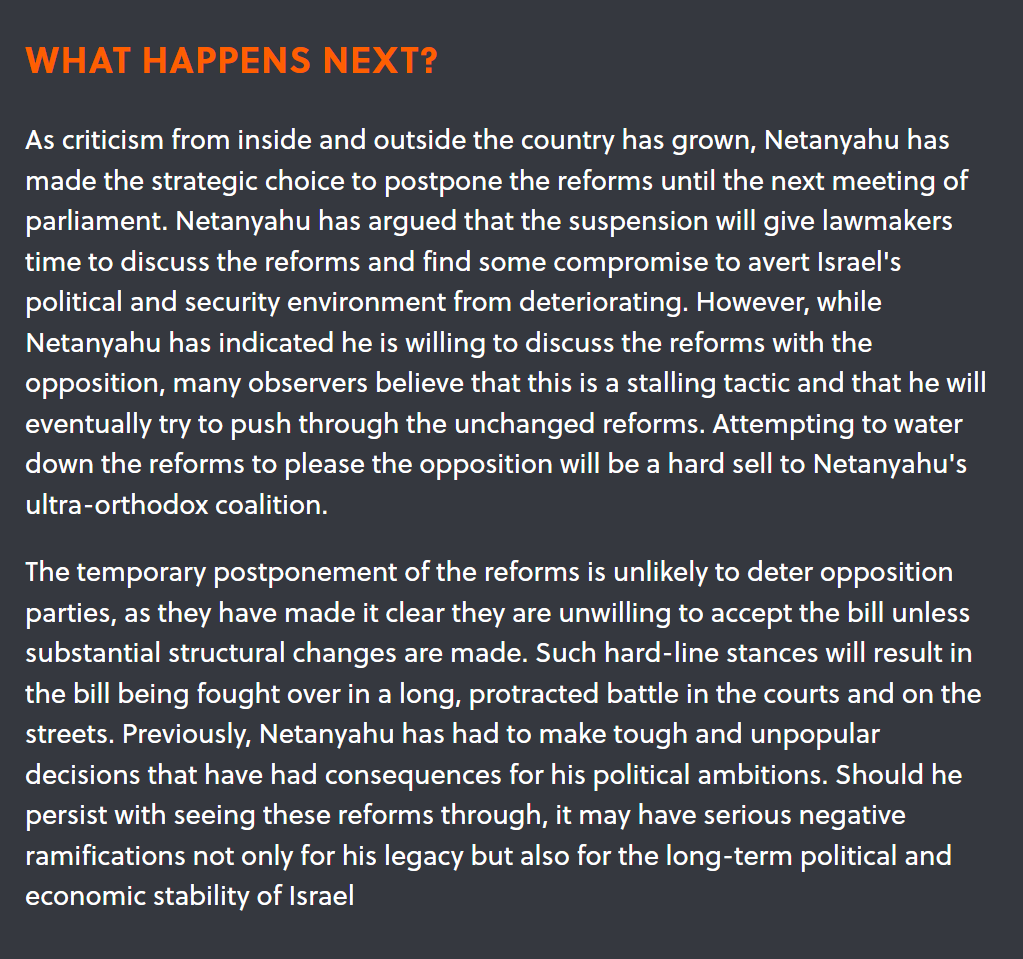Civil Unrest in Israel: Is the Middle East's only democracy under threat?
On 14 May 2023, Israel will celebrate its 75th year of independence and the continued progress of its democratic nation as an outlier in a region known for instability and authoritarian rule. However, such celebrations will be overshadowed by recent countrywide anti-government demonstrations and concerns among Israelis and the international community that the Middle East’s only democracy is facing a crisis. A set of proposed judicial reforms has been the driving factor behind the recent unrest, but the changes to the judiciary pose more fundamental questions about the legitimacy of Israel’s democracy.
The issue of judicial reform is not new and has been on Israel’s policy agenda since 1978. According to a poll commissioned by the Jewish People Policy Institute (JPPI) published on 7 February 2023, 84 percent of Israelis agree the judicial system needs to be overhauled, and there have been at least six failed attempts at reform since 1978. But the public debate over the matter is less about whether reform should happen and more about what that reform should entail – popular support for these most recent reforms sits at just 22 percent. Critics argue the newly proposed reforms will unduly shift the balance of power towards the executive by severely limiting the power of the Israeli Supreme Court. The government, on the other hand, insists the changes will bring necessary balance to an overly active Israeli judicial system, where they see judges having too much power to intervene in political matters.
REFORM, A PATHWAY TO AUTHORITARIAN RULE?
Israel does not have a written, codified constitution, and its judiciary has been the main counterbalance against an abuse of executive power with the courts contending that the Basic Laws of Israel are a quasi-constitution that it can enforce. The executive is attempting to take advantage of this ambiguity and maximise its control. The proposed changes to the judiciary would allow Israel’s parliament, the Knesset, to override the Supreme Court with a simple majority of 61 out of 120 seats. It would also remove the court's ability to review Knesset legislation and give control over appointing judges to the ruling party rather than to legal experts.
According to those on the right, the judicial system has been dominated by left politics since the inception of Israel. The right believes that the proposed change will duly limit the courts and, more importantly, any leftist influence on the right’s attempt to make political changes. Additionally, there are calls from Prime Minister Benjamin Netanyahu’s ruling coalition, which contains ultra-Orthodox Jews and far-right parties, to establish more conservative policies and assert the "Jewishness" of Israel. The opposition sees these as indicators of an attempt to usher in a more non-democratic form of governance. In previous terms, Netanyahu has criticised the Supreme Court for overturning government decisions. The courts have also charged politicians on allegations of corruption – including Netanyahu. Securing greater control over the courts could also mean greater impunity for political leaders.
Although the initial stages of the bill passed through the Knesset on 14 March sparking an uptick in unrest, three months of persistent protests eventually took their toll. On 27 March, Netanyahu announced a full suspension of all reforms pending further dialogue and consultation with opposition parties and lawmakers when parliament resumes in April. Some members of Netanyahu’s government have suggested that they intend to push the original reforms through, while the opposition parties remain strongly opposed. The threat of a deadlock between a non-compromising government and opponents of the bill may result in more uncertainty and contribute to the further deterioration of Israel’s political and security environment.
INTERNATIONAL PRESSURES
Critics fear the reforms will have multiple negative consequences for Israel. A perceived retreating democracy would be a highly unattractive proposition for two of Israel’s most important allies, the US and the UK. Israel's strong political, economic, and military relationship with both countries is based on shared democratic principles. Israel has modelled itself on being the Middle East’s only democracy and has used this to deflect criticism stemming from the Palestinian issue. A less democratic or authoritarian-led Israel could mean less oversight when addressing settlement issues.
Shared democratic values have helped legitimise Israel's regime and the US and UK’s relationship with Israel, and have shielded Israel from ostracism on the Palestinian issue globally. Netanyahu’s initial decision to postpone some elements of the reforms was reported to have followed a conversation with US President Joe Biden. Additionally, in an unprecedented move for US-Israel relations, Biden further publicly criticised the reforms and Netanyahu's apparent unwillingness to reach a compromise with opposition leaders. Since then, Netanyahu has rebuked the statements, insisting that decisions on judicial reform will not be influenced by “pressures from abroad”. British Prime Minister Rishi Sunak also voiced some concerns over the reform when Netanyahu arrived for an official state visit to the UK on 24 March.

ECONOMY UNDER FIRE
The reforms and associated protests have also had significant impacts on Israel’s economy. Between 7 January, when protests began, and the end of March, the Tel Aviv Stock Exchange lost 25 percent of its value, and the Israeli shekel nine percent against the dollar. The reforms have also led international investors to consider withdrawing their capital. Several major financial institutions, such as J.P. Morgan, Fitch and Moody's, have issued statements of concern, noting that there may be an increased investment risk posed by the judicial changes.
Local business is eyeing the changes warily, too. Two Israeli start-ups, Papaya Global, valued at USD 3.7 billion, and Disruptive Technologies Venture Capital, with a capital investment of USD 250 million in Israel, have already stated their intent to withdraw their investments amid the judicial overhaul. The possible withdrawal of investment is a major concern for Israel’s tech sector; the sector derives 90 percent of its funding from foreign direct investment and constitutes about 30 percent of Israel’s gross domestic product (GDP). On the ground, business has been seriously hampered by the protests, as demonstrators have blockaded roads and ports and disrupted business activities countrywide. Additionally, the firing of Israeli Defence Minister Yoav Gallant on 26 March due to his calls to halt the reforms only led to further protest action. On 27 March, Histadrut's (General Organisation of Workers in Israel) strike action brought the country's aviation, manufacturing, banking, and agricultural sectors to a halt, further damaging the economy.

